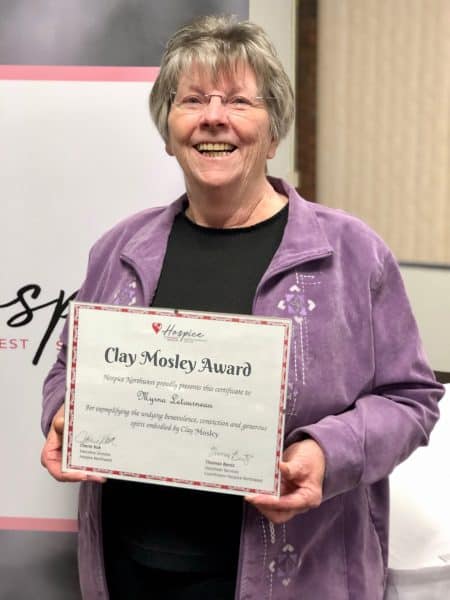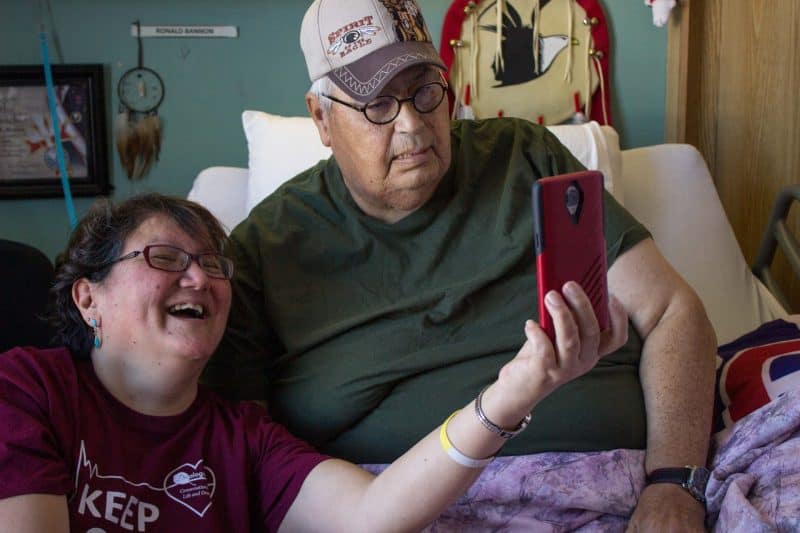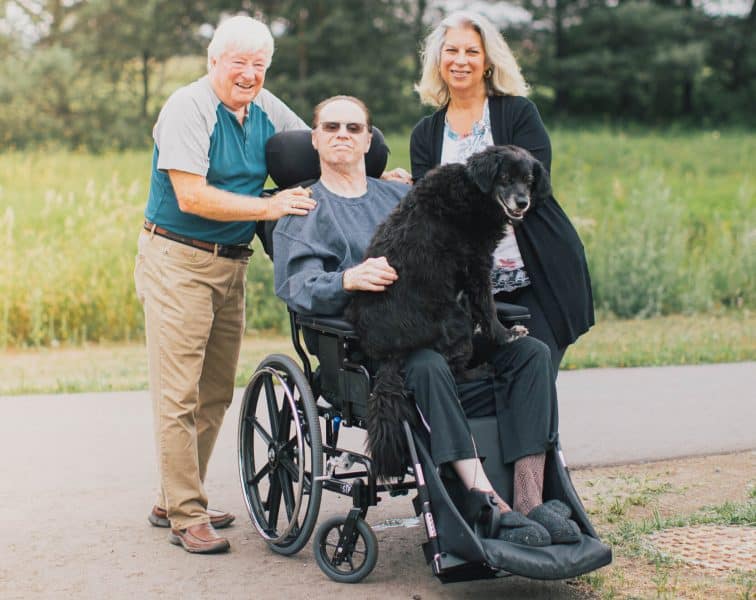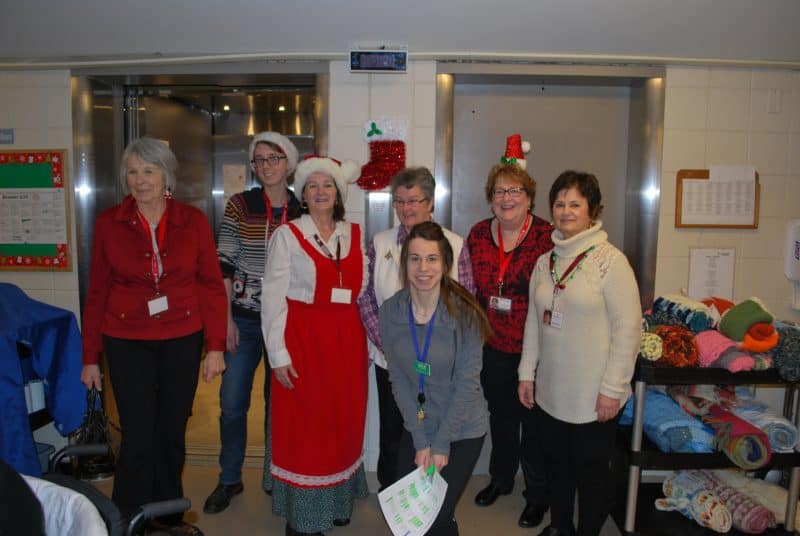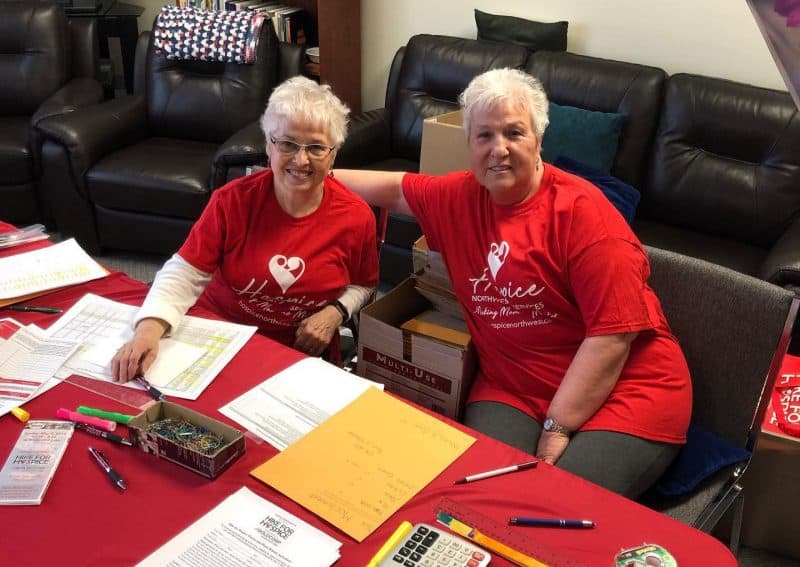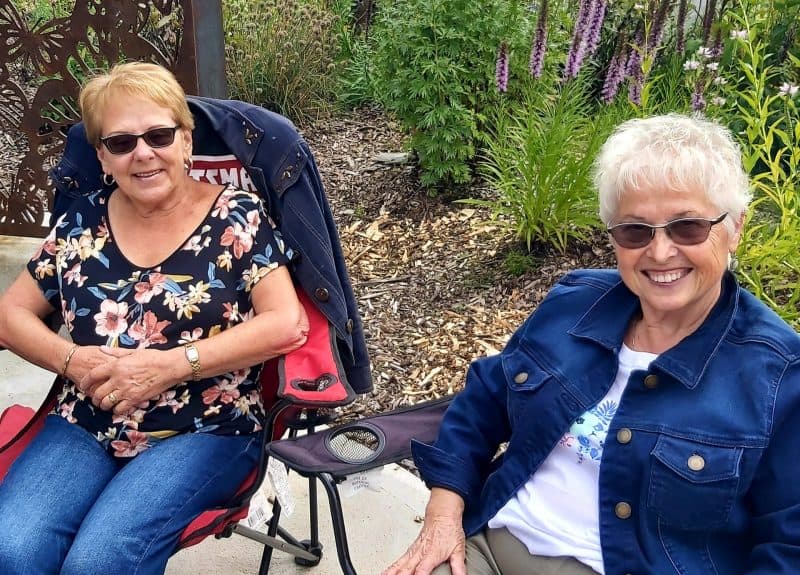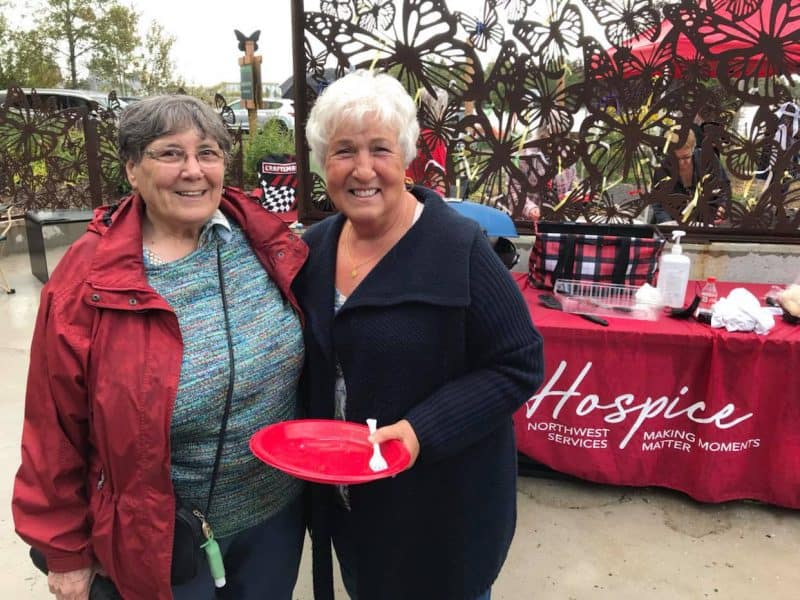Hospice Northwest Services Volunteer Program
Are you looking to join a group of individuals dedicated to offering compassionate care and support to people who are dying or grieving the loss of a loved one. Since 1987, our volunteers have been compassionate listeners with a caring attitude and a desire to give back to their community.
Often our volunteers form lasting friendships that provide them with personal growth and a very special sense of belonging.
How to Get Started as a Volunteer
Step 1
Submit an Application Form for review by our Volunteer Coordinator
Step 2
Complete Introductory Screening Interview to ensure you're a good fit
Step 3
Attend the provincially accredited training program.
Volunteer Requirements
Hospice volunteers are required to adhere to the following:
- Must maintain confidentiality at all times
- Must be at least 18 years old
- Must complete the volunteer training program
- Must be able to commit a period of time to hospice volunteering (eg. 3 hours each week for at least one year)
- Must be available to meet with the Hospice Northwest staff for support, supervision and on-going education
- Must display palliative care traits that include being compassionate, non-judgmental, accepting, self-confident and sensitive to others' needs
- Access to the Internet is beneficial
From Our Volunteers...
I am a nursing student at Lakehead University! Hospice care is extremely important to me and has helped many of my friends and family members through difficult times. I am an animal lover, I have a horse, two dogs, and countless fish! I am from Dryden, Ontario, and love outdoor activities such as fishing and snowmobiling. Family is the most important thing to me and I’m so happy to be able to spend time with them. I am eager to give back to my community and make a difference.
-- Stevie Fishwhich
In my native tongue the word "friend" means 'someone who has your back' and I will support you to the best of my abilities. I am thrilled to meet with you on my Canada journey!"
-- Hasan Ercan
As a volunteer, I offer compassionate support and listen without judgement in confidence. Through my phone conversations, I have met many wonderful people in our community. I feel like the one who has been enriched by the call. I look forward to my journey with Hospice Northwest.
-- Joanne Fox
I had heard lots about Hospice working at Bethammi. I believe that just by spending few hours per week with someone, I can make his/her days better. They are maybe already in pain physically, so they deserve a peaceful mind.
-- Trang Nhu
I consider all life's opportunities a blessing. I was blessed with a profession and passion in nursing for 40 years, in geriatric and palliative care. I was also the primary caregiver for my dear husband who has passed recently with complications due to Parkinsonism. In his honor and memory, volunteering for Hospice Northwest is allowing me to make a difference. Through my heart, I am able to value and use my gifts of kindness, patience, listening, and caring. To be compassionate, to give a client/family a feeling of trustworthiness, and to receive respect and dignity from me, I believe I can provide them with a positive difference in their quality of life.
-- Noella Bouley
I joined Hospice Northwest because I wanted to help make a difference in the community. I have previously volunteered in other health care settings and felt like Hospice was the next step to further my volunteering. This initiative is able to be a support in so many ways to so many people.
-- Hanna Merner
Become a Volunteer
If you are interested in starting your volunteer journey, you can call the Volunteer Coordinator at 807-626-5570 ext 5572 or fill out our online application
Frequently Asked Questions About Becoming a Volunteer
- Must be at least 18 years old
- Must submit a current police records check report from the police service in whose jurisdiction the applicant resides. This will include a search of the Vulnerable Sector or Pardoned Sexual Offender Database
- Must complete the volunteer training program and accessibility training
- Must be able to maintain confidentiality at all times
- Must be able to commit a period of time to hospice volunteering (eg. 3 hours each week for at least one year)
- Must be available to meet with the Hospice Northwest staff for support, supervision and on-going education
- Must display palliative care traits that include being compassionate, non-judgmental, accepting, self-confident and sensitive to others' needs
- Access to a computer/Internet is beneficial as much of the training is online
- A valid driver's license, insurance coverage and access to a vehicle
- The ability to speak more than one language is a plus
- The willingness to visit the client in various locations, such as home, hospital or long-term care facilities. Volunteers are asked which location they prefer when they begin volunteering. We will make an effort to respect your preference; however, volunteers are encouraged to continue with their clients even if the location of their client changes.
When you sign up as a Hospice Northwest volunteer, you are required to complete a provincially accredited training program, delivered through a variety of formats including online training modules and group sessions. These informative classes and modules will help you understand the many issues people face at the end of life.
You will be required to complete 13 HPCO online modules (approx. 30 hours), independent studies and 4 local training sessions, offered either face-to-face or by Zoom (depending on Covid-19 restrictions), each lasting approximately 3 hours.
Our online training program is offered through the Hospice Palliative Care Ontario (HPCO), and is delivered through a platform provided by Saint Elizabeth. Our in-person modules are taught by experts in the field of hospice palliative care and include sessions on Role of the Volunteer, Body Mechanics, Cultural Considerations, Communication Skills and Grief and Bereavement training.
All volunteers complete a provincially accredited hospice volunteer training program that is delivered through a variety of formats including online training modules, group sessions and recorded training videos. Although the training modules are subject to change each year, the following list outlines the kind of information a volunteer can expect to learn during a hospice volunteer training program.
- Module 1: Introduction to Hospice Palliative Care
This session provides participants with an opportunity to learn more about the concept and history of hospice and palliative care. - Module 2: Role of the Volunteer and Understanding Professional Boundaries
This session is designed to clarify the objectives and importance of hospice volunteers, and will outline the role of volunteer, including an understanding of the boundaries involved in hospice volunteering. - Module 3: Communication Skills
Good communication is a vital component of the client/volunteer relationship. In this session, participants learn the types of communication, the importance of effective communication skills, the barriers they might encounter and the importance of confidentiality. - Module 4: Pain and Symptom Management
This module will explore the importance of pain management as well as the sources and factors affecting client pain. - Module 5: Understanding the Dying Process
Participants will learn the common signs and symptoms of the dying process and the difference between medical emergency versus imminent (expected) death - Module 6: Spirituality
This module helps the volunteer understand the role of spirituality and religion in death and dying. It will explore spiritual distress and resiliency and well as methods of spiritual support. - Module 7: Grief and Bereavement
An overview of grief, bereavement and mourning will be presented, along with an exploration of the nature of grief and grief theory. - Module 8: Care for the Caregiver
Topics within this module include the types, duties and importance of caregivers, as well as stress, burnout and compassion fatigue and strategies for coping with stress. - Module 9: The Family
This session is designed to help volunteers gain awareness of the family as a system, how the roles within a family can change in response to illness and death, and how volunteers can support family members. - Module 10: Ethical Issues in Hospice Care
Participants learn about some of the ethical issues within palliative care and how to approach ethical dilemmas within the values and principles they might encounter as hospice volunteers. Limits to the volunteer role and the importance of boundaries will also be addressed. - Module 11: Psycho-social Issues and Impact on Illness
Participants learn about the psycho-social issues and common fears in hospice palliative care, how volunteers can help, the general treatment or therapy regime, and common illnesses experienced by those receiving palliative care. - Module 12: Cultural Considerations
Understanding diversity, cultural and personal cultures and the impact on volunteer caregiving will be explored. - Module 13: Infection Prevention and Control
This session will look at the chain of infection and how to break it, hand hygiene, routine practices, the transmission of respiratory infection and other infection control measures. - Module 14: Body Mechanics, Assists and Other Skills
- Module 15: Orientation to Hospice Policies
Because we are investing in your education to become a hospice volunteer, we require a fee of $100 to cover the cost of training, which is due by the day of the first group sessions. However, upon the completion of 15 hours of volunteering, or 6 months of consistent service with Hospice Northwest, you have the choice of donating your training fee to Hospice Northwest and receiving an income tax donation receipt in return, or we can fully reimburse the training fee to you.
Hospice Northwest provides all the same services that are delivered across the District of Thunder Bay, including volunteer training. These programs are supported by our head office in Thunder Bay and offered in partnership with other health care providers located in out-lining district communities. Our regional communities include:
- Biigtigong Nishnaabeg
- Biinjitiwaakik Zaaging Anishinaabek
- Fort William First Nation
- Geraldton/Longlac
- Long Lake #58
- Manitouwadge
- Marathon
- Michipicoten
- Namaygoosisagagun
- Nipigon
- Pays Plat
- Pic Mobert
- Red Lake (Lake Helen)
- Terrace Bay/Schreiber
We ask that you commit to a minimum of 3 hours of visiting each week for at least one year, although this varies according to the volunteer's availability and the clients' needs.
Your role as a volunteer may include:
- Active listening and non-judgemental acceptance of the client's journey
- Providing companionship and support to the client and family, both in the community, long term care facilities and acute care hospital settings
- Engaging in client focused conversation - if possible always let the client lead the discussion
- Accompanying the client to appointments
- Providing simple comfort measures for a client, e.g. fluffing pillows, positioning, etc.
- Providing diversional activities, i.e. reading, music, playing cards
- Aiding in feeding, grooming such as simple bathing, hair, nails, makeup, shaving
- Making phone calls, writing letters or reading to client
- Preparing light meals or beverages
- Assisting with funeral arrangements if requested
- Doing small errands for family/client
- Advising the client or family if unable to visit at scheduled time
- Maintaining records of visits and submitting them regularly to Hospice Northwest office or entering hours directly to on line system
- Attending regular monthly volunteer meetings
- Advising the office of vacation, sick leave or other needs that may affect availability
- Observing boundaries and limitations of role
- Observing standards and protocols when working in institutions
- Protecting the integrity of the organization
- When advocacy is requested, you must clarify that your client does want you to speak to other members of the care team in order to improve some aspect of the care. If you are uncomfortable or unsure of how to proceed, call the office for assistance from a designated supervisor.
We ask that you visit a minimum of 3 hours per week but you and your client can decide what your visiting schedule will look like. Visits can include phone calls as well.
Hospice Northwest offers a variety of volunteer get-togethers, support meetings and training opportunities throughout the year. While these events are optional, we do recommend volunteers attend at least occasionally. The HNW Volunteer Coordinator will also be phoning you on a regular basis to check on how your visits are going, offer support and answer questions as needed.
We often hear that our volunteers receive back much more than they give. Our volunteers make a huge difference in people's lives and that sense of giving back to their community is very rewarding.
Helping others promotes satisfaction and self-worth. Volunteering is good for your health - mind, body, and spirit! Meeting new people and making new friends is also a benefit of becoming a hospice volunteer.
Getting to know your clients and their families and attending HNW events provides you with wonderful
opportunities to meet others.
Become a Volunteer
If you are interested in starting your volunteer journey, you can call the Volunteer Coordinator at 807-626-5570 ext 5572 or fill out our online application
